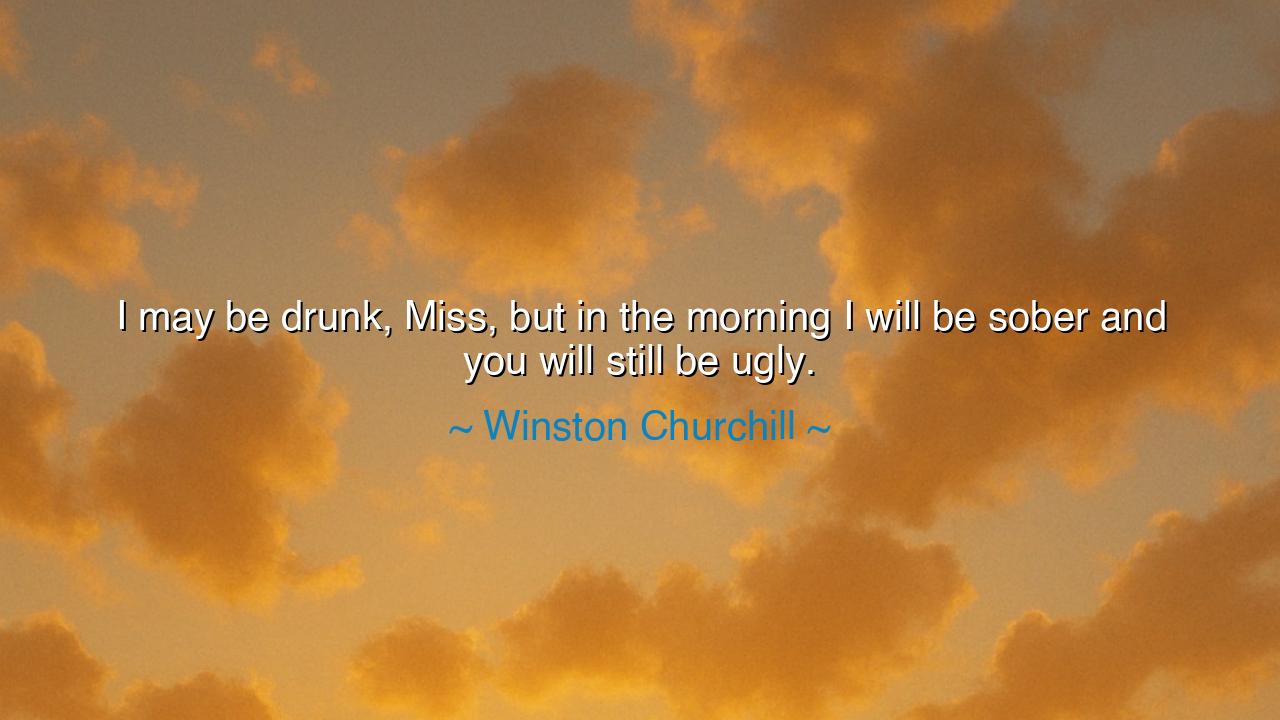
I may be drunk, Miss, but in the morning I will be sober and you






In the pursuit of truth, there are moments when words sting with the precision of a blade, cutting through the veil of decorum and revealing a deeper, often uncomfortable truth. Winston Churchill, the statesman and orator whose words echoed across the globe during some of history's darkest hours, once delivered a line that rings with both wit and courage: "I may be drunk, Miss, but in the morning I will be sober and you will still be ugly." While at first glance, this remark seems like a crude jest, it is in fact a profound reflection on the nature of truth, perception, and the sometimes-necessary force of blunt honesty.
The power of Churchill’s words lies in their raw honesty. There are times when our emotions and social niceties obscure the truth that lies beneath the surface. Churchill, in his inimitable way, cut through the facade of superficiality and spoke plainly about the nature of reality. To be “drunk” is not merely a state of inebriation, but a metaphor for how easily we can become blinded by emotion and pretense. The point Churchill makes is not about the alcohol itself but about the difference between temporary states and permanent truths. Sober judgment, like clear-eyed wisdom, sees things as they truly are, without the distortion of fleeting feelings.
In the ancient world, the philosophers were well aware of the tension between appearance and reality. Plato in his famous allegory of the cave spoke of the shadows on the wall, which represented the distorted truths that people see when they live in ignorance, confined to the confines of their limited understanding. It is only when one emerges into the light of knowledge that they can see things as they truly are, without the distortion of illusion. Just as Churchill's words remind us that even a moment of drunkenness fades, yet the fundamental nature of things remains unaltered, so too did Plato warn that the truth is not swayed by the illusions of the world around us.
The humor of Churchill’s remark also reveals the complexity of human relationships. His quip is both a deflection of a challenge and a playful taunt, demonstrating that in the right circumstances, humor can be a tool for both defense and insight. Humor, in this sense, is a form of social armor, a way of navigating the sometimes treacherous waters of human interaction. Much like the great rhetoricians of the past, who used humor and irony to wield influence, Churchill understood that words, when chosen with precision, could be used to assert power and command respect.
The wisdom that we derive from Churchill’s words is rooted in the necessity of clarity and honesty in all human dealings. To face the world as it truly is requires a form of moral courage—the courage to see things plainly, without the comforting veil of illusion. The world is often uncomfortable, and the truth can be difficult to face. Yet, in embracing this truth, we find our path forward. Just as Churchill stood unflinchingly before the gravest of challenges during World War II, calling his people to fight with resilience and determination, so too must we confront the harsh truths of our own lives, understanding that only by seeing things clearly can we act decisively and with purpose.
Consider the example of Nelson Mandela, who spent 27 years imprisoned, yet emerged with a vision not of bitterness, but of reconciliation. He faced the truth of his country’s deeply ingrained racial inequality, but rather than being consumed by anger or despair, he used this understanding as the foundation for change. His ability to confront the reality of his circumstances—unflinching and clear-eyed—enabled him to lead his people toward a more just future. In this sense, both Mandela and Churchill exemplify the power of embracing the unvarnished truth and using it as a force for good.
The lesson embedded in Churchill’s words is one of profound authenticity and courage. In our daily lives, we are often faced with situations where the truth is difficult to confront or express. Whether in personal relationships, in our work, or in the broader social and political world, we must learn to distinguish between temporary emotions and permanent truths. Sometimes, the truth may come out sharply, without the softness we wish it had, but in these moments, we must remember that it is the truth that holds the power to heal, to empower, and to guide us forward.
In practical terms, the advice is clear: when faced with difficult situations or uncomfortable truths, we must summon the courage to face them directly, without resorting to false comforts or evasions. Just as Churchill showed that even in moments of humor, there can be a deeper wisdom, so too must we approach our challenges with clarity, authenticity, and courage. And when we speak, let us do so with the full awareness that while our emotions may fluctuate, the truth, once known, remains as steadfast as the morning sun, unwavering in its power and influence.






AAdministratorAdministrator
Welcome, honored guests. Please leave a comment, we will respond soon